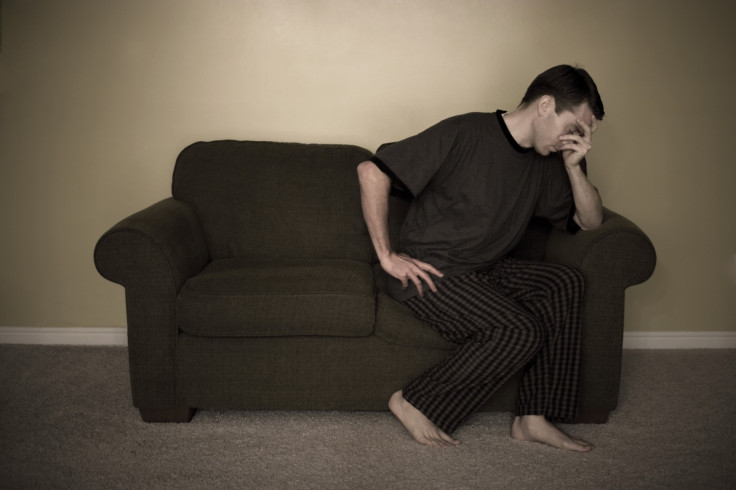Five ways to stop feeling guilty all the time
Chronic, irrational guilt can be crippling for your mental health.

Virtually everyone feels guilty some of the time. Guilt is a part of life, and in healthy doses it can be good for our relationships and social lives. But being constantly plagued by guilt can be crippling. But how much guilt is normal and healthy, and what can you do about it if you suffer from chronic guilt?
Fundamentally, guilt stems from thoughts that we are responsible for another's misfortune. It manifests as a feeling of remorse or sadness when we believe we've caused harm. This can vary from feeling guilty about not contacting a loved one as frequently as we'd might, to cheating on a partner. Guilt falls into two categories: healthy, appropriate guilt and unhealthy, irrational guilt.
Although an unpleasant feeling, appropriate guilt helps us to regulate our social behaviour. Feeling guilty for a justifiable reason is a sign that your personal moral compass is working properly. Ideally, this should help to stop you repeating or making mistakes.
Appropriate guilt can also be useful in limiting bad behaviour – for example, you might decide to stop smoking for the sake of your family because you feel guilty about harming them. Maintaining a healthy level of guilt helps to prompt us to face up to our mistakes and apologise for them.
But chronic guilt can make ordinary situations feel like a catastrophe of your own making. Before looking at how this can be overcome, let's think about where guilt comes from in the first place.
Are we born with guilt?
The guilt mechanism is associated with social boundaries and laws and helps to stop us from doing deeds that would have a negative impact on the people around us. This guilt is further conditioned into us as children by our parents, teachers, faith and society.
Brain imaging studies have explored the concept of morality and the self-conscious emotions linked to it – including shame and guilt. The key differentiator between the two emotions is that shame is usually focused on the presence of other people, whereas guilt can overcome us without others. For example, you might feel guilty about indulging in unhealthy food even if no one is watching.
In this respect, guilt is an emotion often triggered by the brain's limbic system, which tends to be short-termist and doesn't take into account much, if anything, beyond satisfying immediate urges. In this regard, it overrides the brain's frontal cortex, which plays a key part in the formation of rational thoughts and exercise of self-control. Eventually though, after you've eaten that slice of cake, your frontal cortex kicks in, leaving you with that guilty feeling.
People respond to guilt in different ways
We are all unique and experience and respond to guilt in different ways. What we value, the nature of our moral compass and how we process our emotions will all inform the way we react to certain situations.
One person might not think twice about not tipping a waiter in a restaurant, but someone else might ruminate endlessly, wondering whether they caused offence: "What if they were depending on it – should I return and apologise?"
The perpetual feeling of guilt is known as 'guilt-proneness'. Those who experience guilt-proneness are believed to have a strong connection with their own – and others' – emotions. They are most often more psychologically well-adjusted so as to avoid antisocial behaviour, and they typically have good relationship skills.

Chronic guilt
Crucially, guilt is a pervasive emotion that can become chronic if we don't take steps to resolve it. People who experience chronic guilt may mistakenly believe they have caused other people harm when they haven't.
Guilt can manifest as 'automatic thoughts' which is when an individual misinterprets a situation, assumes those involved are offended or suffering but then does not question the logic of their jumped-to conclusions. People who are plagued by guilt are prone to 'catastrophising' – reading the worst in a situation or 'overgeneralising' in which is where they imagine various bad outcomes as opposed to just one.
Unhealthy guilt is rooted in low self-esteem, resulting in a distorted self-importance where we assume that we are in some way responsible for an outcome. Chronic guilt sufferers attribute an element of blame to themselves for any mishap in their lives.
Near-constant irrational guilt has been linked to mental illnesses such as anxiety, depression, dysphoria (feelings of constant dissatisfaction) and obsessive-compulsive disorder (OCD). Obsessive guilt can cause sufferers to believe they are a burden to their loved ones and those around them. They may feel they are constantly in the wrong even though this may not be the case.
Unchecked guilt can also result in flagging concentration and productivity, low mood, increased stress and lack of sleep. In turn, our relationships, daily actions and overall outlook on life can be adversely affected.

Five tips for overcoming guilt
- Practise mindfulness: Mindfulness is a proactive step that you can take in order to gain some calm and put your guilt into perspective. Mindful meditation focuses on breathing as way of paying attention to the moment, as this calms the mind and body. When practising meditation, find a quiet place, practise deep breathing, notice thoughts and feelings as they appear, allowing them to pass without judgement, before focusing once again on breathing.
- Remember your favourite way to relax: Distract yourself with your favourite music, a book or go out for some exercise or a breath of fresh air.
- Be proactive: If you feel that your guilt is justified, and you have come to this conclusion through rational thinking, take a proactive response. Make timely changes, make amends, say sorry and move on.
- Learn from your mistakes and errors: Don't beat yourself up about it. Constantly revisiting past mistakes will not benefit anyone.
- Remember that perfection does not exist: Looking for the 'perfect' solution can lead to mental gridlock, which is unhelpful. Learn to accept the 'best' solution for the circumstances instead and retain a sense of perspective.
There is no magical solution to guilty feelings and, if they are justified, then it is much healthier not to try and get rid of them. Instead, accept them and use them to behave more positively in the future.
Dr Mark Winwood is director of psychological services for AXA PPP healthcare.
© Copyright IBTimes 2025. All rights reserved.





















